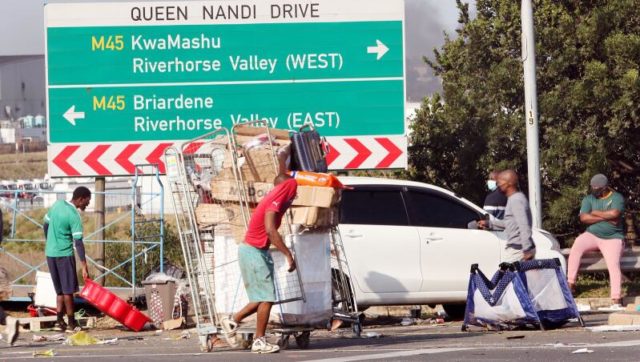The Pietermaritzburg Economic Justice and Dignity group (PMBEJD) said its September report had shown a massive food price spike in cities that had been affected by the recent unrests.
DURBAN – THE Pietermaritzburg Economic Justice and Dignity group (PMBEJD) said its September report revealed that yearon-year low-income households in the country were struggling to purchase basic household needs.
The PMBEJD said the overall cost of the average household food basket increased by R363.14 (9.4%) from R3856.34 in September 2020 to R4219.48 in September 2021.
The report found that at an average cost of R2 278.90 in September 2021, the cost of the foods prioritised and bought first in the household food basket were relatively very expensive in relation to the total money available in the household purse to secure food.
“These foods must be bought regardless of price escalations. The high cost of core staple foods result in a lot of proper nutritious food being removed off the family plates. The consequences of high costs on the core foods has a negative impact on overall household health and well-being, and child development.”
PMBEJD said, overall, South African households showed the average cost of the basket was at the highest level since it started tracking the household food basket in September 2020.
The group tracks food price data from 44 supermarkets and 30 butcheries, in Johannesburg, Durban, Cape Town, Pietermaritzburg and Springbok (in the Northern Cape).
It tracks basic household foods bought by low-income households including maize meal, rice, cake flour, white sugar, sugar beans, samp, cooking oil, salt, potatoes, onions, frozen chicken portions, curry powder, stock cubes, soup, tea, white bread, and brown bread.
Mervyn Abrahams, programme co-ordinator for PMBEJD, said indications were these were the first signs that low income households were feeling the impact of the Covid-19 pandemic. He said job losses, coupled with the impact of the recent looting and unrest, would also lead to increased food prices and increased transport costs to purchase basic food needs.
Abrahams said the unrest in KwaZulu-Natal and Gauteng did not happen in a vacuum but also signalled the widespread hunger caused by the Covid-19 pandemic and job losses that affected the ability to afford basic food needs.
He added that Statistics South Africa’s recently updated Food Poverty Line was now R624 per capita per month, while the Child Support Grant of R460 per child per month (including the emergency SRD R350 grant) was now 26% to 44% below the Food Poverty Line.
“These things have cumulative and broad economic impacts. The long term solution would be to create more jobs and livelihoods. Between now and then the government has to accommodate the 26% deficit for affordability. The social grant system is an important instrument to reach children and break intergenerational poverty levels.
“Massive industrialisation of agriculture is pushing individual farmers out. Government must support efforts to bring in more small players to equalise market share and keep food prices down.”
Abrahams added the eThekwini and Msunduzi municipalities also needed to issue more permits allowing informal trade on the road. “The informal sector presents solidarity and understanding of trade needs with the community. Government has to balance the transformation of the food system and the economy at the same time.”
Professor Irrshad Kaseeram, deputy dean of research at the University of Zululand’s Economics department, agreed that unemployment estimated at 34.4% was causing inequality and putting basic needs such as food out of reach for many.
Kaseeram anticipated that if the inequalities were not addressed, it could potentially lead to more unrest.
He said the government needed to look at the unrest as an opportunity to innovate tax and other incentives for business confidence and the creation of employment, or those with resources would feel more vulnerable and opt for migration.
“Some of the companies that were affected by the unrest would be reluctant to open, and many of the companies affected relied on customers for trade, which would have led to more people losing jobs. When a big business is reluctant to reopen, the passing trade or customers are also lost.
“We need a social compact that is better than the one we currently have. Not enough is being done for small business development and we need more effective policies. Government also has to incentivise big business to employ youth,” said Kaseeram.
THE MERCURY








